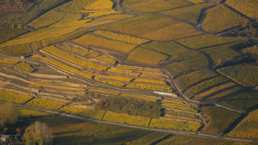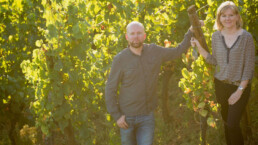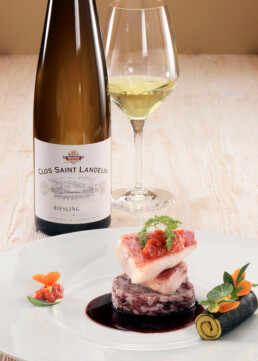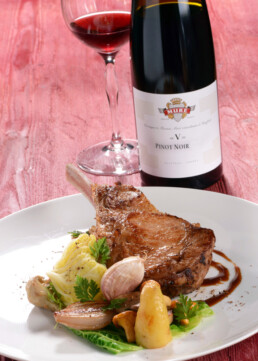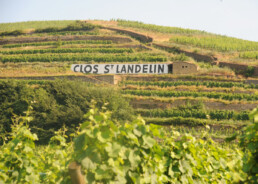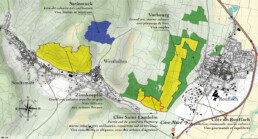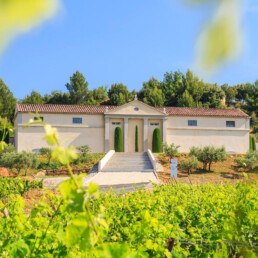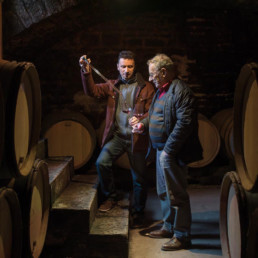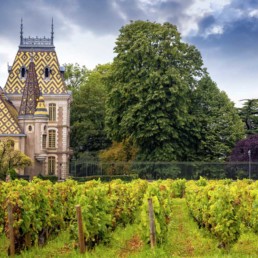Domaine Mure: The Allure of Alsace
Biodynamic winemaking excellence handed down through 12 generations.
Tucked away in a corner along the eastern border of France, sits the stunningly beautiful wine region of Alsace. Through history Alsace has often been the chess pawn as spoils of war by the feuding countries of Germany and France. Hence, this history has shaped not just the accents and architecture of the region but also their wines. Alsace is truly a wine-lover’s paradise as these wines tell a story: they demonstrate their heritage and also brilliantly communicate the terroir they come from. As this month’s Dhall and Nash Wondermaker Domaine Muré so perfectly encapsulates – get ready to be enchanted by their aromatic spell!
The Family History:
And what a history the Muré family has! It was established by Michel Muré in 1650 in Westhalten, South Alsace. Obviously, when Michel first planted his vineyard, he surely had little idea of the vinous adventure that he was setting in motion for his descendants. Over the centuries their vineyards have come to encompass several Grand Cru in Zinnkoepfle and their crown jewel of Clos Saint Landelin within the Grand Cru of Vorbourg. These areas have been regularly described as the best of Alsace Grand Cru since the 7th Century. And Domaine Muré itself has enjoyed similar acclaim as one of the best wineries in Alsace since the 17th Century.
It was in 1935 that the next generation headed by Alfred Muré further extended the property with the addition of the 12 hectare (25 acre) monopole (wholly owned) Clos Saint Landelin, foreseeing already its potential for exceptional quality. He replanted the terraces, ideally situated with their sunny exposure and shelter from the rain. Then in 1966, brothers Oscar and Armand Muré moved the family winery site from Westhalten to Rouffach.
Nowadays, it is Alfred’s grandson René Muré, (the 11th generation) who took over the domaine in 1976 and who continues to be involved, offering advice and much valued help to Alfred’s great grandchildren Véronique and Thomas, the 12th generation of the family, who are now responsible for running this exceptional monopole vineyard and its neighbouring terroirs.
The young guard is now Thomas Muré who studied viticulture and oenology in Beaujolais. He divides his time between the cellar and the domaine’s 25 hectares (62 acres) of vines, whilst Veronique did a degree in agronomy. She is responsible for the commercial and administrative side of the domaine. The grand family traditions continue…
In the Vineyard - The Muré Philosophy:
“I found that at Muré the terroir really shines through” – Antonio Galloni, Vinous
This is a winery that has meticulous attention to detail and an historic commitment to quality. Such traditions meant that it was a no-brainer for the estate’s 28 hectares (70 acres) to become both biodynamic (Demeter) and organic (Ecocert) certified, demonstrating that no chemical or synthetic products are used.
Most of us know about organics, but less so about biodynamics – here’s a quick overview on biodynamic farming. It was started by Austrian philosopher, Rudolf Steiner, in the 1920s. Worldwide, it has become the catch call for numerous top-quality winemakers and producers. Biodynamic wine production uses organic farming methods (for example, natural compost as fertilizer and avoiding chemical pesticides, fungicides, herbicides, etc.) while also employing natural soil supplements prepared according to Steiner’s formulas. Further, they follow a planting and harvesting calendar that depends upon astrological and lunar cycles – in short, they are ecologically self-sufficient in which they treat their vineyard as a living and interconnected ecosystem.
Domaine Murés total production is not vast but it is still considered sizeable for the Alsace region. The 70 acres of family estates have been farmed organically since 1999, with priority given to hand tilling and to dense planting (about 10,000 plants per hectare or 2.5 acres), which encourages the vines to put down deep roots and stimulates biological activity in the soil.
Thanks to their deep roots, the vines absorb precious mineral elements from the subsoil. These bear the unique imprint of the terroir and contribute to the pronounced minerality of the Muré estate wines. Additionally, these vines are low yielding (from 30-45 hl/ha), which is another contributory factor in allowing the grapes to confer on the wine the true expression of their terroir. Harvesting is done entirely by hand and grapes are manually sorted in the vineyard. They are then transported in crates no bigger than 20kg capacity to avoid squashing. The whole bunches are then tipped gently (without crushing or destemming) into the press.
This extra care in applying biodynamic practices throughout the vineyards contributes to healthy, well aerated soils, quality fruit, as well as to increased flora and fauna and the general well-being of the vines. All resulting in remarkable harmony and balance which characterises the wines of Rene Muré.
The Muré Wines:
Unlike the rest of France, Alsace wines have the grape variety on the label – but do not be misled that this means the wines are “simple”. On the contrary, they are wines that have the definitive “signature” of each unique terroir from Alsace. And undoubtedly, the Domaine Muré wines clearly show typicity, terroir and elegance whose flavours fan out into a complex peacock’s tail of subtlety.
The Domaine Muré range of wines is made up of two distinct categories – one is the very accessible varietals of the Côte-de-Rouffach (communal appellation) and the Signature ranges. The other is the extraordinary Grand Cru varietals of their monopole Clos Saint Landelin (within the Vorbourg Grand Cru) and Grand Cru Zinnkoepfle.
The Signature range is a return to the traditional dry and delicately fruity wines with steely acidity. They are wines typified by their freshness and varietal characteristics and are exceptional value. Ideally, these are consumed whilst young and lively.
With this luscious style in mind, 2019 will be the first vintage that Dhall and Nash has collaborated with Domaine Muré who are providing their exquisite Alsace fruit for our very own Bohemian Gewürztraminer label. What a coup!
Now, onto their much-lauded Grand Cru sites: The Clos St Landelin Grand Cru is one of the great viticultural sites for the expressiveness and exotic power it imparts to Alsace’s noble varieties. This monopole of the Domaine produces grapes which are concentrated and rich with exquisitely honed mineral acidity.
The Domaine wines that are labelled Clos Saint Landelin are produced from the estate vineyards in the Grand Cru Vorbourg. Among the Domaine wines there is an impressively steely Sylvaner from the Clos which is full of ripe, green fruits and minerals, and is one of the finest examples in the region.
Intense, long-lived Riesling comes from Vorbourg and Clos Saint Landelin, as does rich, spicy and opulent Gewürztraminer and Pinot Gris coming from Lutzeltal as well as the Clos.
Depending on the year, Clos Saint Landelin also produces top-quality Vendanges Tardives (late harvest) and Sélection de Grains Nobles (botrytis-affected) wines.
Along with Riesling, Gewürztraminer and Tokay Pinot Gris, Clos Saint Landelin is favoured by the regular occurrence of noble rot due to the proximity to the tiny Ohmbach river immediately below the Clos. The river creates a moist environment in which autumn mists develop – favouring the development of Botrytis Cinerea, the all-important noble rot essential to the production of top-level sweet wines. Elegant and complex, the wines from this outstanding vineyard develop fine fruit aromas and are extremely long-lived!
See the full Domaine Muré range that we carry below:
Domaine Muré Clos Saint Landelin Riesling
Domaine Muré Calcaires Jaunes Riesling
Domaine Muré Orchidées Sauvages Gewurztraminer
Domaine Muré Les Iris Pinot Blanc
Domaine Muré Pierres Sèches Pinot Gris
Domaine Mure V Pinot Noir
Domaine Muré Crémant d’Alsace Brut NV
The Muré Terroir - Their Vineyards:
“We have to stay in contact with the climate and the terroir.” – René Muré
Situated at the warmer southern end of the Alsace wine-growing region (10 miles south of the town of Colmar), the Rouffach vineyards and their environs have been famous since Roman times.
The Vosges ranges protect this subregion from rain and snow-bearing west winds, resulting in an exceptionally sunny, dry climate – with just 500mm (20 inches) of rain, amazingly, the annual precipitation rate is less than that of Nice and half that of neighbouring German wine regions.
To this can be added the richness of the clay-limestone soils and calcareous sandstone subsoils, which are equally suited to each of the seven different permitted Alsace grape varieties: Riesling, Pinot Noir, Gewürztraminer, Pinot Gris, Muscat, Sylvaner and Pinot Blanc.
Clos Saint Landelin covers 25 acres on the south-facing slopes. Benefiting from a hot and dry climate, this limestone hillside has been a vineyard since the eighth century, when it belonged to the influential Bishop of Strasbourg. The Bishop bequeathed the site to the monks of Saint-Landelin abbey. It remained in their tenure until the French revolution.
The walled vineyard (Clos) is situated in the southern part of the 73 hectare (180 acre) Vorbourg Grand Cru vineyard just southwest of the town of Rouffach. As such, it qualifies for the Alsace Grand Cru title and wines from the Clos may feature the Vorbourg name on the label as well as that of the Clos. The site boasts a number of terraces cultivated in order to aid soil retention of the rocky, clay-limestone slope. Although the lower slopes contain more calcerous sandstone, the Clos’ geology is generally similar to that of the wider Vorbourg with multiple clay-marl layers.
The vineyard is planted with six varieties. Riesling is found on the lower slopes, with Gewürztraminer and Muscat in the centre. Closest to the southern spur of the hill and the town of Ruffach, in the very southeastern corner of the Clos is the Sylvaner, with the Pinot Gris at the opposite, southwestern end. On the top reaches of the Clos, Pinot Noir is planted. Although Pinot Noir represents 10% (and rising) of Alsace’s vine plantings, it is not permitted under the current Alsace Grand Cru appellation laws. Red Clos Saint Landelin wine does not therefore qualify as Grand Cru and must be sold under the regional Alsace appellation.
Though situated only 500 metres away from Clos Saint Landelin, the plots in the Grand Cru Vorbourg vineyard are richer in clay. They produce powerful, velvety wines, elegant expressions of fruit aromas with good acidity on the finish.
Mure’s other Grand Cru vineyard, the Zinnkoepflé produces fresh, complex and spicy wines with intense floral aromas, at once startling and then so seductive with pronounced minerality. The geological make up here is of calcareous sandstone topsoil with a predominance of shell limestone from the Triassic period. Geographically, it is situated in the Soultzmatt Valley which is south-east facing. It has very steep slopes, at 420 metres (1200 feet) above sea level, Zinnkoepflé is the highest Grand Cru vineyard in Alsace. The varieties planted here are Gewürztraminer and Riesling
The plateau located above the Clos Saint Landelin is named “Lutzeltal”. The soil is particularly stony here: it is sandy limestone with a little clay. The climate is very dry due to the exposure to the wind and to the fact it has the lowest precipitation. Consequently, they train the vine to have deep roots, and they purposely avoid high yields. The wines are very delicate and are characterised by an aromatic palate based on fruits. The Lutzeltal site is renown for producing beautiful Pinot Gris.
The “Steinstuck” vineyard is nestled above the village of Westhalten and gives racy and fresh wines marked by minerally chalky notes and hints of wet stone. The limestone terroir is very stony aptly named Steinstuck which means “stoney plot” in Alsatian dialect.
In all the vineyards, the work is done by traditional ploughing and biodynamic/organic farming, reflecting respect for the terroir. Further, the work in the cellar is low intervention and minimalist – striving to reflect as much as possible their unique terroir. Additionally, they feel the “signature” of their land is also highlighted by using indigenous yeasts for all fermentations whilst maturing the wines on lees for added texture. All in all, creating balance and harmony as the hallmark of Muré aromatic wines.
Without exception, Domaine Muré wines are fine and rich with beautifully mineral‐laden acidity. This is largely achieved in the vineyard where Alsace’s naturally long ripening season is enhanced by Muré’s highly prized south‐facing slopes. However, these elegant wines are also an extension of not just their terroir but also of the people who craft them – steeped in a lengthy family history that gives a deep sense of continuity and pride in their vinous jewels. These are truly exciting wines – abundant in flavour, opulence and ethereal grace.
Reviews & Accolades:
2016 Domaine Muré Calcaires Jaunes Riesling
“The fresh nose almost has a hint of salted lemon. On the palate both lemon and tart, red apple takes over but the lemon streak of bright freshness dominates for now, creating drive. The concentrated body is bone dry and comes to a mouth-watering, super clean and long finish.” 93/100 points Wine Enthusiast
2017 Domaine Muré Orchidées Sauvages Gewürztraminer
“Intense red-apple notes are interspersed with vivid, aromatic touches of orange zest on the nose of this wine. The palate reinforces this apple and citrus juiciness, adding a pithy, phenolic edge that gives texture and is mouth-watering, with energy and warmth at the core. This wine has lovely balance, drive and an off-dry finish.” 92/100 points Wine Enthusiast
2013 Domaine Muré Clos Saint Landelin Riesling (Single Vineyard, Grand Cru Vorbourg & Monopole)
“Firm acidity is almost lip-smacking here, but shows lovely integration with the notes of tangerine, passion fruit, fresh quince and smoke, with a minerally salinity and a refined, silky texture. Drink now through 2025.” 93/100 points Wine Spectator
2018 Domaine Muré Pinot Blanc Les Iris
“A whiff of flint is all the nose of this wine gives away. The palate presents gentle, fresh red apple and subtle, bright but ripe lemon. A slight yeasty edge gives texture to this light, dry and harmonious wine.” 89/100 points Wine Enthusiast
NV Domaine Muré Crémant d’Alsace Brut
“Bright fresh notes of greengage and lemon play on the nose. The palate has the same zippy fruit flavours which are ripe but remain resolutely fresh. The mousse is frothy and lively, accentuating the lemony brightness even more against a more mellow autolytic background. A wonderfully balanced dry fresh apéritif.” 90/100 points Wine Enthusiast
